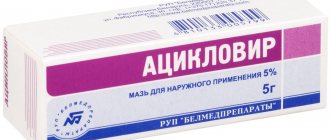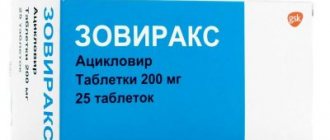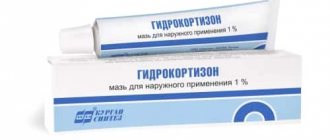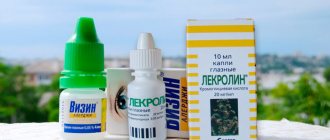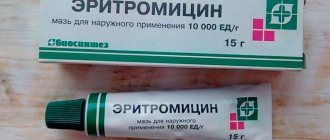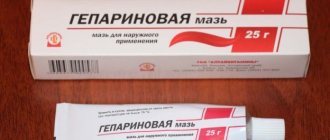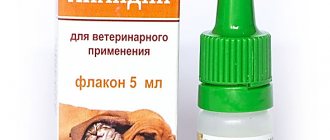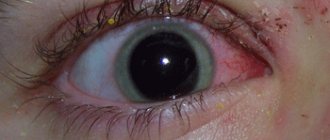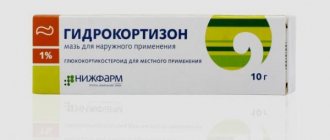Glucocorticosteroid ophthalmic ointment with dexamethasone is an anti-inflammatory agent that is often used for allergies to treat immunosuppressive conditions and shock. The ointment is considered a synthetic analogue of a natural hormone that is secreted by the adrenal glands. The product quickly penetrates the mucous tissues and is absorbed into the blood. Helps get rid of exudate without causing photosensitivity.
What is the composition and mechanism of operation?
The main component of the drug is dexamethasone. This is a hormone that is produced in the human body, only synthesized with the help of chemicals, and is 35 times more effective than the hormone cortisone. It reduces the synthesis of prostaglandins, and thus inhibits inflammatory processes in the mucous membranes. Dexamethasone narrows and reduces the permeability of small vessels. The ointment has the following effect:
- anti-inflammatory;
- desensitizing;
- anti-shock;
- immunosuppressive;
- antiallergic.
Available in the form of eye drops and ointments, tablets and solutions for injections. The product can cope with inflammation at different stages of its development. At the same time, the substance can negatively affect the patient’s natural local immunity and make the body more defenseless against bacteria, primarily from the fungal group.
Purpose of application
Dexamethasone ointment is used to treat ophthalmic problems. This is a drug with a noticeable effect, having anti-inflammatory and anti-edematous properties.
Dexamethasone is effective in eliminating various diseases of the eyes and mucous membranes of the eyes. Reasons for prescribing the drug:
- The beginning of inflammatory processes in the surface layer of the eyeball. At a minimum, we are talking about eyelids, sclera, corneas and conjunctivae.
- Inflammatory processes after an injury, burn, surgery (as for the last point, the ointment can be used only after the final healing of all injuries).
- The onset of inflammatory processes in the choroid or iris of the eyeballs and ciliary body.
The principle of action of the drug
Subsequently, the breakdown of Dexamethasone in the patient's body produces lipocortin. This is the name of a substance that inhibits inflammatory mediators, an allergic reaction (because lipocortin is able to suppress the process of phospholipah A2 synthesis, inhibit the processes of endoperoxide production, the release of arachidoic acids, and inhibition of the formation of prostaglandin and leukotriene).
Dexamethasone ointment affects the following metabolic processes in the body:
- protein;
- carbohydrate;
- lipid;
- water-electrolyte.
The drug affects the process of protein metabolism . Dexamethasone reduces the amount of globulins and their quantitative ratio with albumin. The ointment can increase the production of albumin in the liver, as well as accelerate the process of protein breakdown in muscle tissue.
As for the effect on the process of carbohydrate metabolism, the drug increases the amount of absorption of carbohydrates that enter the body with food. It promotes the process of transfer of glucose from liver tissue into the blood. The ointment also stimulates the process of glucose formation.
As for lipid metabolism, Dexamethasone accelerates the formation of fatty acids , and as a result of its assistance in the redistribution of fat, fat deposition will increase in the areas of the face, shoulders and abdomen.
Due to the effect of Dexamethasone on the process of water-electrolyte metabolism, potassium leaves the body faster, and sodium and water are retained. There is less calcium in the bone tissue and it is excreted in the urine.
Inflammatory processes are suppressed due to the inhibition of a group of specific mediators. The degree of permeability of the walls of the cardiovascular system decreases, the membrane and structure of the cells become stronger. The essence of the antiallergic effect of Dexamethasone is to suppress the production of substances that are responsible for the further development of the allergic reaction.
It will also prevent the proliferation of lymphoid and connective tissue cells, and reduce the body’s sensitivity to certain allergic mediators. We are talking about substances that affect how the immune response is formed.
Indications for use
The drug is used by patients after eye surgery.
The corticosteroid substance is widely used for severe infections such as meningococcus or diphtheria, peritonitis, influenza, typhoid fever, dermatosis, laryngeal edema, asthma and otitis media. Dexamethasone ointment is used in ophthalmology, in the presence of such factors in the patient as:
- postoperative period on the eyeball;
- conjunctivitis;
- keratitis;
- blepharitis;
- episcleritis;
- iridocyclitis;
- scleritis;
- uevitis;
- eye burn;
- iritis;
- sympathetic ophthalmia.
Analogs
Ointment for external use has a wide spectrum of action, but if necessary, you need to know similar products that can replace the drug.
One of the most common analogues, which includes dexamethasone, is the drug “Dexa-Gentamicin”. It is available in the form of ointment and eye drops. The first dosage form is more effective and therefore more common.
The drug contains a corticosteroid and an antibiotic, due to which it has antibacterial, antiallergic, bactericidal and anti-inflammatory effects. It is prohibited to use Dexa-Gentamicin for viral and fungal infections of the eye, chickenpox, glaucoma, keratitis dendritis and various injuries.
Another popular drug with a similar effect is Tobradex. One of the active ingredients of the ointment is a powerful antibiotic - tobramycin. The drug is used for inflammation of the organs of vision. Sometimes Tobradex causes negative side effects such as pain, eye discomfort and irritation. Quite rarely, after taking the drug, a runny nose, laryngospasm and headaches may occur.
Maxidex is also a substitute for Dexamethasone. It is available in the form of ointment and drops. The drug has a pronounced anti-inflammatory and antiallergic effect. The product is used for eye inflammation, thermal and chemical burns, as well as after operations. Long-term use of Maxidex can lead to complications such as damage to the optic nerve, narrowing of the visual field, steroid glaucoma and corneal perforation.
Contraindications
Instructions for use prohibit the use of Dexamethasone ointment for patients who have not yet reached the age of 18, and also if the patient’s medical history includes circumstances such as:
Pregnant women are not recommended to use the ointment.
- allergy to the main active ingredient;
- During pregnancy and breastfeeding;
- purulent infection without prior treatment with antibiotics;
- trachoma;
- eye tuberculosis;
- glaucoma;
- burn;
- perforating injury to the eyeball;
- period after removal of a foreign body from the eye.
Effect
Due to the antiallergic effect of the drug, its use eliminates the following symptoms:
- swelling;
- pain;
- redness;
- itching and burning;
- irritation.
The ointment also helps to activate metabolic processes in cells and accelerates the restoration of damaged areas.
According to the instructions for use of Dexamethasone ointment, in addition to the active substance, the product contains a complex of auxiliary components that moisturize the mucous membrane of the eye.
Instructions for use
The course of treatment is prescribed by the doctor based on the individual characteristics of the patient. On average, treatment with Dexamethasone ointment can last from one day to 3 weeks. The drug is placed behind the lower eyelid, in a strip no more than 1.5 cm in length. The effectiveness of its use can be felt within an hour after use. The procedure must be carried out 3 times a day.
At the end of the course of treatment, the dose of the drug must be reduced gradually; with abrupt withdrawal, negative reactions may occur.
Mechanism of action
How does Dexamethasone ointment work? The instructions say that after placing the product behind the lower eyelid, its active substance quickly penetrates into the upper layers of the eye. The ointment has a local effect and exhibits anti-edema, anti-inflammatory and anti-allergic properties. Under the influence of the drug, there is a decrease in the permeability of small blood vessels, as well as their narrowing.
Dexamethasone ointment eliminates allergic reactions, swelling, redness of the sclera and other signs of inflammation. This effect of the drug is due to the fact that it can significantly reduce the activity, formation and transportation of biological substances taking part in the described processes.
Side effects
If the medicine is abused, a headache may occur.
With improper and prolonged use of the substance dexamethasone for eye treatment, the following adverse reactions may occur, such as:
- glaucoma;
- damage to the optic nerve;
- cataract;
- impaired visual acuity;
- increased intracranial pressure;
- headache;
- cataract;
- tissue swelling;
- lacrimation;
- burning and tingling;
- redness of the eyelids and lens;
- the occurrence of a fungal infection;
- slow regeneration in the postoperative and post-burn treatment period.
Side effects
What side effects can Dexamethasone ointment cause? Consumers claim that if you use this remedy as recommended by your doctor for a short period of time, there will be no negative symptoms. With longer use (more than 10 days), the following manifestations may develop:
- cataract;
- damage to the optic nerve, which subsequently leads to visual impairment;
- increased intraocular pressure, which is accompanied by severe headaches;
- slow development of glaucoma;
- the appearance of cataracts;
- when using Dexamethasone ointment for the skin, slow wound healing may occur;
- manifestation of allergic reactions in the form of swelling and redness.
If the patient has thinning of the cornea, long-term use of the drug can lead to perforation. In addition, the drug can reduce the immunity of eye tissue, which in turn contributes to the addition of a bacterial or fungal infection. Pathogenic microorganisms will be masked by the active substance of the drug, which relieves all signs of inflammation.
Interaction with other drugs
Combining such an ointment with insulin is undesirable.
Dexamethasone ointment should not be used together with barbiturates, somatotropin, phenytoin, rifmapcin, as they can reduce its effect. Substances such as:
- sodium;
- cardiac glycoside;
- diuretic;
- inhibitors;
- insulin;
- antiviral vaccines;
- NSAIDs.
Cheap analogues
Recommendations for selecting an analogue are received after undergoing diagnostics from leading specialists. Cheap substitutes also work, but have their own contraindications.
To find cheap drops, pay attention to the composition, namely the same active ingredients and indications for use.
Dexapos
The indications are the same. Belongs to the group of corticosteroids and is prescribed for severe forms of an allergic reaction.
Drops are prescribed to prevent inflammatory processes in the eye. The effect of the drug begins after 2 minutes. The effect lasts from 4 to 8 hours.
With prolonged use, eye drops increase intraocular pressure and provoke the development of secondary glaucoma. Prohibited for bacterial infections, chicken pox and viral diseases.
Price - 35 rub.
Prednisolone
It is used as a drip injection of a solution into the conjunctival cavity. When instilled, the medicine penetrates the systemic bloodstream.
A synthetic glucocorticoid drug relieves inflammation, has antipruritic, antiallergic and antiexudative effects. Contraindicated in acute purulent processes, fungal eye pathologies, keratitis and corneal epitheliopathy.
Use 1-2 drops 2-4 times a day, depending on the diagnosis. For inflammation, once a day is enough.
Cost - 12 rubles.
Hydrocortisone
Similar to Dexamethasone, it has an anti-inflammatory and antiallergic effect. It also inhibits the development of scarring and reduces capillary permeability.
Used for conjunctivitis, dermatitis, blepharitis, iritis and keratitis, uveitis and burns of the eye membranes. Do not use for bacterial and viral lesions, children under 2 years of age, ulcers. Price - 14 rubles.
More information about the drug can be found here and here
special instructions
The instructions for dexamethasone ointment prohibit its use while taking alcohol. The drug should be used with caution by those who have recently been in contact with patients with measles and smallpox, as well as if the patient has the following ailments:
- colitis;
- hypoalbuminemia;
- intestinal diverticulitis;
- tuberculosis;
- hypothyroidism;
- tissue sepsis in the active stage;
- cirrhosis of the liver;
- hypertension;
- emotional lability.
Negative sides
The use of Dexamethasone ointment helps to reduce the body's defenses. As mentioned above, this leads to the penetration of pathogenic bacteria into the affected area, which significantly worsens the patient’s condition. Since the ointment perfectly suppresses inflammatory processes, it is impossible to immediately identify this pathology. That is why experts do not recommend using the drug for a long time.
In addition, the active substance can negatively affect sexual development and normal growth, and therefore treatment of children and adolescents with Dexamethasone ointment is prohibited.
